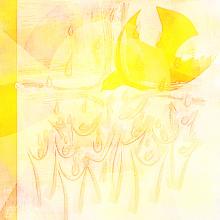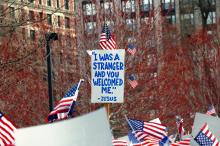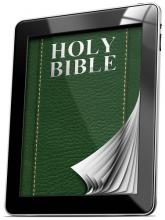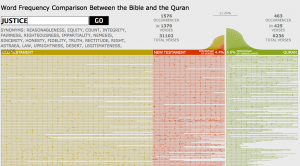New Testament

Some books utterly disrupt you. I was doing research for an essay on St. Augustine and slavery when I first came across humanities scholar Jennifer Glancy’s Slavery in Early Christianity. Reading this book made me realize that everything I thought I knew about the history of Christianity and slavery was wrong.

Most often Pentecost comes to us as a momentous Christian occasion of spiritual power, ethnic unity, gender equality, multi-generational comradery, and immigrant hospitality. But when the moment has passed, it gives way to the more ignoble features of life and community, like spiritual apathy, sexism, racial prejudice, ageism, xenophobia, etc.

Since it was unveiled last week, President Trump’s proposed budget has been widely denounced as “immoral” and downright “evil” for boosting defense spending by billions while demanding drastic cuts to vital aid programs.
Yet if liberals and some conservatives are upset about cuts to programs that help ensure clean drinking water, give financial aid to low-income college students, and even help support Meals on Wheels — which delivers nearly a million meals a day to the sick and elderly — would Jesus have a problem with slashing assistance to the needy?

According to several sources, the number 40 is used almost 150 times in the Old and New Testaments. Some examples: Jesus was tempted in the wilderness for 40 days and 40 nights. There were 40 years of wilderness-wandering for the Jewish people fleeing bondage in Egypt. Noah and his family were in the ark for 40 days and 40 nights of the flood. There were 40 days and 40 nights of fasting while Moses was on Mount Sinai. Jonah was given 40 days to convert the people of Nineveh. Saul, David, and Solomon reigned 40 years each.

Sessions has long been, in the words of one prominent immigration advocate, the “most anti-immigrant senator in the chamber.” When George W. Bush, a self-styled “compassionate conservative” and born-again Christian, pushed a comprehensive immigration reform bill in 2007 that was supported by many business and law-enforcement officials, Sessions railed against what he called the “no illegal alien left behind bill” and led the charge against the failed effort. “Good fences make good neighbors,” he said at a press conference the year before.

All was apparently going fine until Micha Brumlik, a retired Frankfurt University education professor and respected Jewish commentator, wrote last June that the popular toy was “anti-Jewish, if not even anti-Semitic.”
The problem, he said, was the inscription on the open pages of the Bible that the Playmobil Luther holds. On the left is written in German: “Books of the Old Testament. END,” while the right page says “The New Testament, translated by Doctor Martin Luther.”

And it's an Old Testament law.
Bob Lonsberry of WHAM 1180 AM radio asked the Republican front-runner, "Is there a favorite Bible verse or Bible story that has informed your thinking or your character through life?"

As long as people have been praying, they have also been asking for prayer from one another. In the Bible, the New Testament is full of requests from Paul and others to pray for them; contemporary places of worship often offer time in their services to pray for the specific needs of their parishioners.
A new app called Instapray makes sense as a digital heir to that tradition.

Ephesians: Can You Find All the Run-on Sentences in this Classic Book? Philippians: How To Build Your Endurance Using This Neat Old Trick. Colossians: You’ll Never Believe What God Looks Like!

"HOW DID THIS HAPPEN?" pondered the middle-aged woman as she panted up the road to her village of Sychar, water jar forgotten. “How did we get into this heavy theological conversation from a simple request for a drink of water? Sometimes conversations take sharp turns, but this is just too bizarre. I’ve known a number of men in my life, but only the crazy ones told me they were the messiah! Better check this out with the town elders.”
In contrast to the approximately 800 references to water in the Hebrew Bible, the New Testament is relatively spare. A friend explained the difference. The ancient Hebrews emerged from the eastern desert cultures of Egypt and Babylonia (now Iraq), which built their empires around rivers and where water was scarce and precious. But the New Testament writers were oriented toward the wetter West, where seafaring Greeks and Romans had appropriated the Mediterranean Sea as their major mode of transportation and conquest. For example, even though the book of Acts only mentions the word “water” in reference to baptism, the early missionary movement depended on travel by ship to spread the gospel message.
Water in the synoptic gospels
All four gospels introduce us to John the Baptist down by the Jordan River, who dunks in its flowing water those who repent from sin as a symbol of their cleansing. After John moves offstage, the synoptic gospels center much of Jesus’ activity in the towns around the Sea of Galilee. Here he not only teaches from a boat (Matthew 13:2; Luke 5:3), but he and his disciples travel in it from one side of the lake to the other, which includes a miraculous walk on and rebuking of the stormy waves (Matthew 14:22-27; Mark 6:47-52; Luke 8:22-25). Other references to water are few and sometimes incidental.

The more I study theology and the more I take Jesus' teachings seriously, the more messy my life becomes.
I was raised to believe that Christianity is about going to church on Sundays, not saying bad words, trying to be good, and having all the right beliefs (and knowing who doesn't have the right beliefs). Within this framework, Christianity is very neat and proper. One dresses in such a way that conforms to modesty (no tattoos and piercings, thank you); one uses coined phrases to know who's really in or out (we say 'blessed' not 'lucky'); one never touches a cigarette or consumes alcohol (because that's what makes us 'not of this world' right?); and one makes sure to only hang out with those who have the same beliefs (for having different beliefs or opinions is clearly a sign of waywardness). This was my world all the way into my 20s.
Then something happened. Or, in actuality, many things happened. I am unable to pinpoint one thing that upended my world. It was a bunch of little and big things that projected me onto a path of radical living, and I give the credit to the Holy Spirit (and to my husband, but that's another story).
As a result of those many little and big things, I began to see the teachings of Jesus and the New Testament in new light. Passages I had heard all my life took on a whole new and radically different meaning. Beliefs I had taken on without thinking came crashing down, as I began to hold them in view of Christ's teachings. It was then I started to discover how far off my thinking, and thus my life orientation, was.

Growing up Catholic in England, Candida Moss felt secure in life, yet was told in church that Christians have been persecuted since the dawn of Christianity. Now, as an adult and a theologian, she wants to set the record straight.
Too many modern Christians invoke, to lamentable effect, an ancient history of persecution that didn’t exist, Moss argues in her newly published book, The Myth of Persecution: How Early Christians Invented A Story of Martyrdom.
Although anti-Christian prejudice was fairly widespread in the church’s first 300 years, she writes, “the prosecution of Christians was rare, and the persecution of Christians was limited to no more than a handful of years.”
We asked Moss, professor of New Testament and early Christianity at the University of Notre Dame, to talk about the travails of early Christians, and how they are misappropriated in the public sphere today. The interview has been edited for length and clarity.

I was watching this recent video where Tim Keller (along with Don Carson and John Piper) addresses why The Gospel Coalition is explicitly complementarian (a nice way to say that they don't believe in gender equality). Why do they see this as something that a group that is supposed to be focused on the Gospel would need to stress?
Keller begins by saying that he does not think the issue of gender roles are directly part of the Gospel, and acknowledges that bringing it up in the context of answering a person's questions of what it would mean to be a Christian could "certainly muddy the waters."
So why the focus then? He says it has to do with how we read Scripture.

What is a church?
Is it the stained-glass windows or welcome bell mounted in the steeple? Is it the straight-backed pews or scent of incense wafting into the narthex? Sunday school classrooms or spaghetti dinners in the basement?
If you view a church as a building, what happens when it goes away?
According to Reuters, 2011 was a record year for church foreclosures:
“Since 2010, 270 churches have been sold after defaulting on their loans, with 90 percent of those sales coming up after a lender-triggered foreclosure, according to the real estate information company CoStar Group," the article reads. "In 2011, 138 churches were sold by banks, an annual record, with no sign that these religious foreclosures are abating, according to CoStar.”
This morning, as I caught up on what had been going on in the world over the weekend, I stumbled across a very interesting resource -- a website that compares the frequency with which words appear in the Bible and the Quran.
Although that in itself is an interesting tool, I was less interested in the comparison feature and more interested to see how often certain words appear in the Bible.
If justice is only an implication, it can easily become optional and, especially in privileged churches, non-existent. In the New Testament, conversion happens in two movements: Repentance and following. Belief and obedience. Salvation and justice. Faith and discipleship.
Atonement-only theology and its churches are in most serious jeopardy of missing the vision of justice at the heart of the kingdom of God. The atonement-only gospel is simply too small, too narrow, too bifurcated, and ultimately too private.

When I applied for a job at CNN in the 90s, and told the interviewer that I had interned with an evangelical magazine called Christianity Today, his response was, "If it's Christian, it isn't journalism."
Over the years that expanded to, "If it's evangelical, it's Republican. Or Jerry Falwell. Pat Robertson. The Tea Party. Wrapped in a Patriotic Flag. White People. Derivative, cheesy music. Big Money. Big Hair." Fill in the rest of the blanks.
Are those labels a distortion of what it means to be an evangelical? Of course they are. Yet they are how evangelicals are perceived, rightly or wrongly (I personally think it's a mixture of both), in our society.
Not every Christian who shares my concern for the poor has the same view on policy or politics. But, here is a prejudice I am not going to back away from.
To be a follower of Christ is to be biased for the poor.
In life, we all have our biases. Some of them are natural tendencies or inclinations and others are habituated. Our culture tells us to be biased -- in a deferential sense -- towards those who can pay us back or who can look out for us in return. Society tells us to get in with the strong and the powerful because they will give us strength and power in return.
Jesus teaches something very different.
Last night, death was interrupted when the U.S. Supreme Court issued a stay of execution for a Texas man convicted of a double murder in Houston in 1995.
Duane Buck was set for execution by lethal injection sometime after 6 p.m., Thursday September 15 in Huntsville, Texas. His execution would have been the second this week and the 11th so far this year in Texas alone. Two more executions are scheduled for next week.
